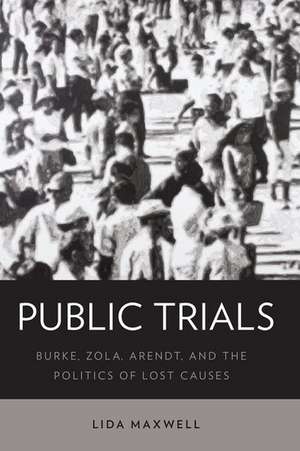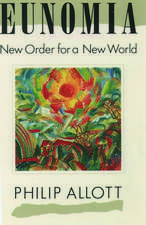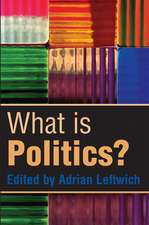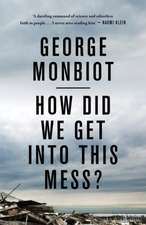Public Trials: Burke, Zola, Arendt, and the Politics of Lost Causes
Autor Lida Maxwellen Limba Engleză Paperback – 10 noi 2016
| Toate formatele și edițiile | Preț | Express |
|---|---|---|
| Paperback (1) | 259.01 lei 32-37 zile | |
| Oxford University Press – 10 noi 2016 | 259.01 lei 32-37 zile | |
| Hardback (1) | 395.43 lei 32-37 zile | |
| Oxford University Press – 15 ian 2015 | 395.43 lei 32-37 zile |
Preț: 259.01 lei
Preț vechi: 322.71 lei
-20% Nou
Puncte Express: 389
Preț estimativ în valută:
49.57€ • 51.68$ • 41.20£
49.57€ • 51.68$ • 41.20£
Carte tipărită la comandă
Livrare economică 10-15 martie
Preluare comenzi: 021 569.72.76
Specificații
ISBN-13: 9780190649845
ISBN-10: 0190649844
Pagini: 256
Dimensiuni: 231 x 155 x 18 mm
Greutate: 0.36 kg
Editura: Oxford University Press
Colecția OUP USA
Locul publicării:New York, United States
ISBN-10: 0190649844
Pagini: 256
Dimensiuni: 231 x 155 x 18 mm
Greutate: 0.36 kg
Editura: Oxford University Press
Colecția OUP USA
Locul publicării:New York, United States
Recenzii
If it is a commonplace that democratic causes are often defeated, even by the people themselves, it does not (indeed, it cannot!) follow that democratic thinkers and actors should abandon their commitments to realizing more just ways of living. Lida Maxwell's Public Trials advances an altogether original and inspiring alternative. Through rich readings of Burke, Zola, and Arendt, Maxwell exemplifies the 'art of losing causes.' Public Trials demonstrates how to create new ways of speaking, writing, and acting in the face of past and present injustice. Vigorously, it summons readers to do the same.
Lida Maxwell has produced a provocative and thrilling book on the 'politics of lost causes.' Seeing in democratic failure opportunity as much as loss, promise as much as pessimism, Maxwell shows how failure solicits action, demands accountability and builds counter-intuitive and unpredictable affiliations committed to lost causes and the possible futures they reveal. This is a risky and unconventional work on the art of losing.
Maxwell's book is a highly innovative work that proposes to see public trials as exemplary sites for democratic politics. She brilliantly reads the 'lost cause' narratives of three public intellectuals, Burke, Zola, and Arendt as offering a productive reformulation of democratic failures and as occasions for responsiveness rather than resignation. It provides a fresh reading of these trials, by going beyond the legal texts to less familiar terrain of the literary imagination. The major contribution of the book lies in its ability to redirect the literature on transitional justice from attempting to tame politics in order to allow for justice, to encouraging a politics of resistance as essential to the pursuit of justice.
Public Trials is an excellent book. Clearly written, well organized, and jargon free, it will be of interest to a wide range of scholars of democracy and law. Highly recommended.
It is a rare gift to encounter a book as historically textured and politically provocative as ^lPublic Trials... Drawing from a wide range of historical and contemporary political phenomena-from the abuses of the East India Company in the eighteenth century to the recent case of the alleged terrorist mastermind Khalid Sheikh Mohammed and from Hannah Arendt's review of the comedic writing of Nathalie Sarraute to an original and persuasive reading of Kathryn Bigelow's 2012 film, ^lZero Dark Thirty
Lida Maxwell has produced a provocative and thrilling book on the 'politics of lost causes.' Seeing in democratic failure opportunity as much as loss, promise as much as pessimism, Maxwell shows how failure solicits action, demands accountability and builds counter-intuitive and unpredictable affiliations committed to lost causes and the possible futures they reveal. This is a risky and unconventional work on the art of losing.
Maxwell's book is a highly innovative work that proposes to see public trials as exemplary sites for democratic politics. She brilliantly reads the 'lost cause' narratives of three public intellectuals, Burke, Zola, and Arendt as offering a productive reformulation of democratic failures and as occasions for responsiveness rather than resignation. It provides a fresh reading of these trials, by going beyond the legal texts to less familiar terrain of the literary imagination. The major contribution of the book lies in its ability to redirect the literature on transitional justice from attempting to tame politics in order to allow for justice, to encouraging a politics of resistance as essential to the pursuit of justice.
Public Trials is an excellent book. Clearly written, well organized, and jargon free, it will be of interest to a wide range of scholars of democracy and law. Highly recommended.
It is a rare gift to encounter a book as historically textured and politically provocative as ^lPublic Trials... Drawing from a wide range of historical and contemporary political phenomena-from the abuses of the East India Company in the eighteenth century to the recent case of the alleged terrorist mastermind Khalid Sheikh Mohammed and from Hannah Arendt's review of the comedic writing of Nathalie Sarraute to an original and persuasive reading of Kathryn Bigelow's 2012 film, ^lZero Dark Thirty
Notă biografică
Lida Maxwell is Assistant Professor of Political Science at Trinity College in Hartford, Connecticut.


















